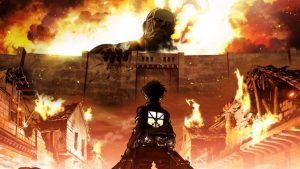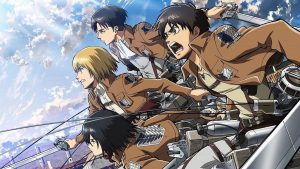The Main Drive of the Humankind:
Attack on Titan and Freedom
by Çağla Nihan Atik

Attack on Titan (2013), the Japanese animation series directed by Tetsurō Araki, makes the audience more aware of one of the primary values—freedom. Having been written as a manga series by Hajime Isayama, this dystopian fiction displays a harsh reality where humankind is on an everlasting fight for their lives that are threatened by the titans. Its adaptation to the anime genre makes its story more accessible and thus, it has been able to make more people aware of this value. People, in the anime, live in a kingdom divided into three layers protected by three walls. The poorest, our main character Eren, is located in the outer area. As a result, the first and the harshest damage is taken by these people in case of an intrusion of the titans. Having lost some loved ones, Eren burns with a desire to fight back. The anime accomplishes something important as dystopian fiction. It uses the fear and sorrow of being eaten by titans. However, what creates the main drive and motivation are not born from fear. Eren mainly desires to be strong and free. The sorrow of the lost ones and fear of getting eaten by a titan are used as a supporter. It ends up displaying an optimistic fiction that promotes and celebrates the fighter nature of the human. Even though Attack on Titan is built on the concept of war and despair, it leads the audience to its trust in the freedom-seeking soul of humankind.
Using what fiction can accomplish, the anime uses complex characters with a detailed backstory to help the audience internalize each. Thus, the opposition of freedom and captivity feels much more real and reflective. Characters within the walls do not look like they know much of their history nor the life outside the walls. Moreover, it is banned to talk about these topics and this is barely a problem for the majority of the people. Not knowing their past or not having an idea about their future does not bother most people. Admittedly, those who want to know and wonder, are cast out. It creates the opposition of freedom and captivity—not only physically but also mentally. One of our three little heroes, Armin, questions, and wonders about the outside world, and he gets beaten up many times because of this. This is one of the individual effects of this fundamental opposition but the anime also handles the collective effect of it. The same hate and rejection also apply to the kingdom’s military unit, the exploring unit, which is specialized to explore outside the walls. Even though they are the most beneficial position within the military, people are unable to see this benefit since they are so terrified of the life outside—and of the unknown. However, Attack on Titan proves that the fear that is driving this hate is nothing impossible to overcome. The anime’s real success is in its displaying how the need for freedom is the main driver of human even in the most fearsome context.

